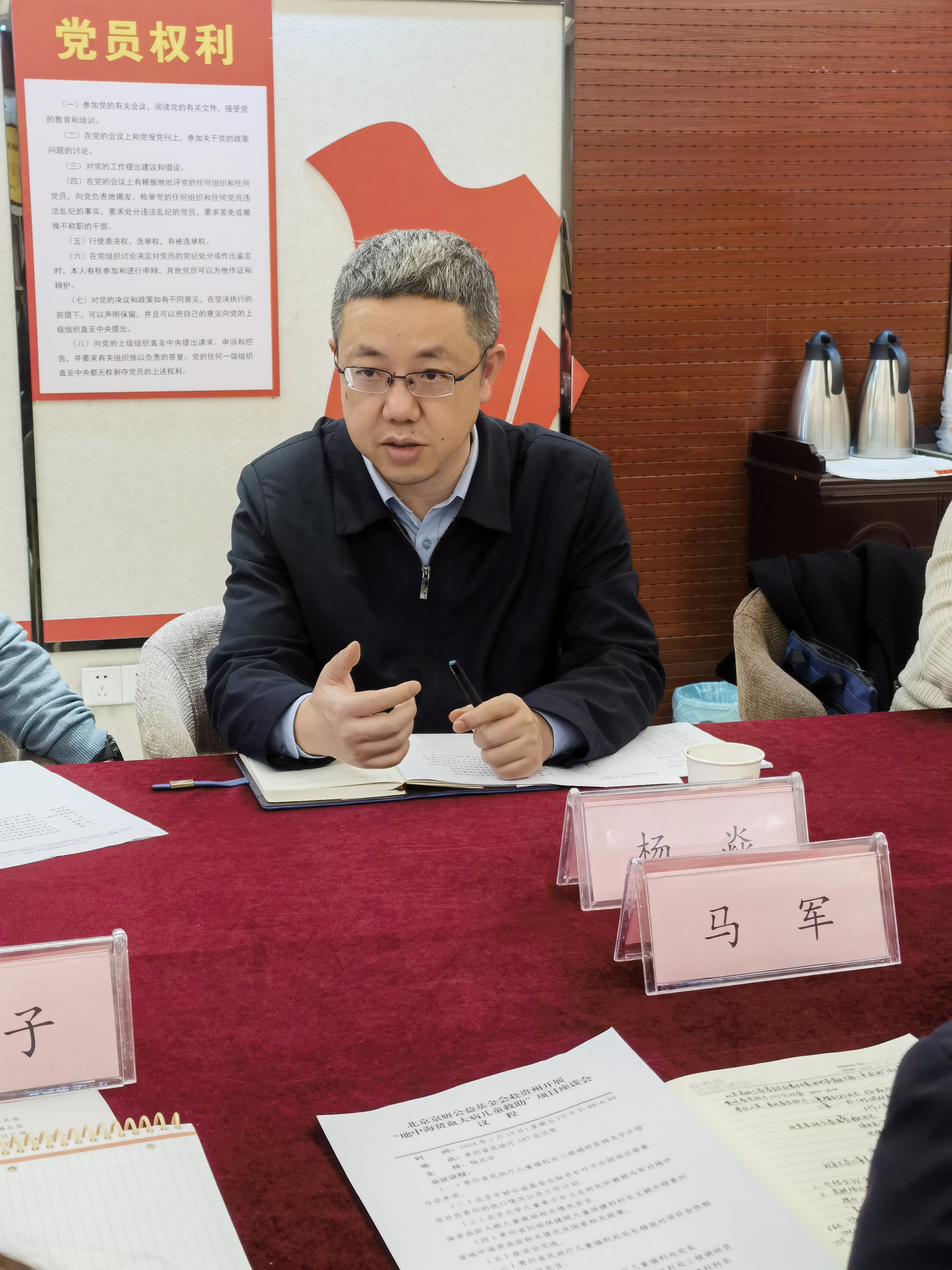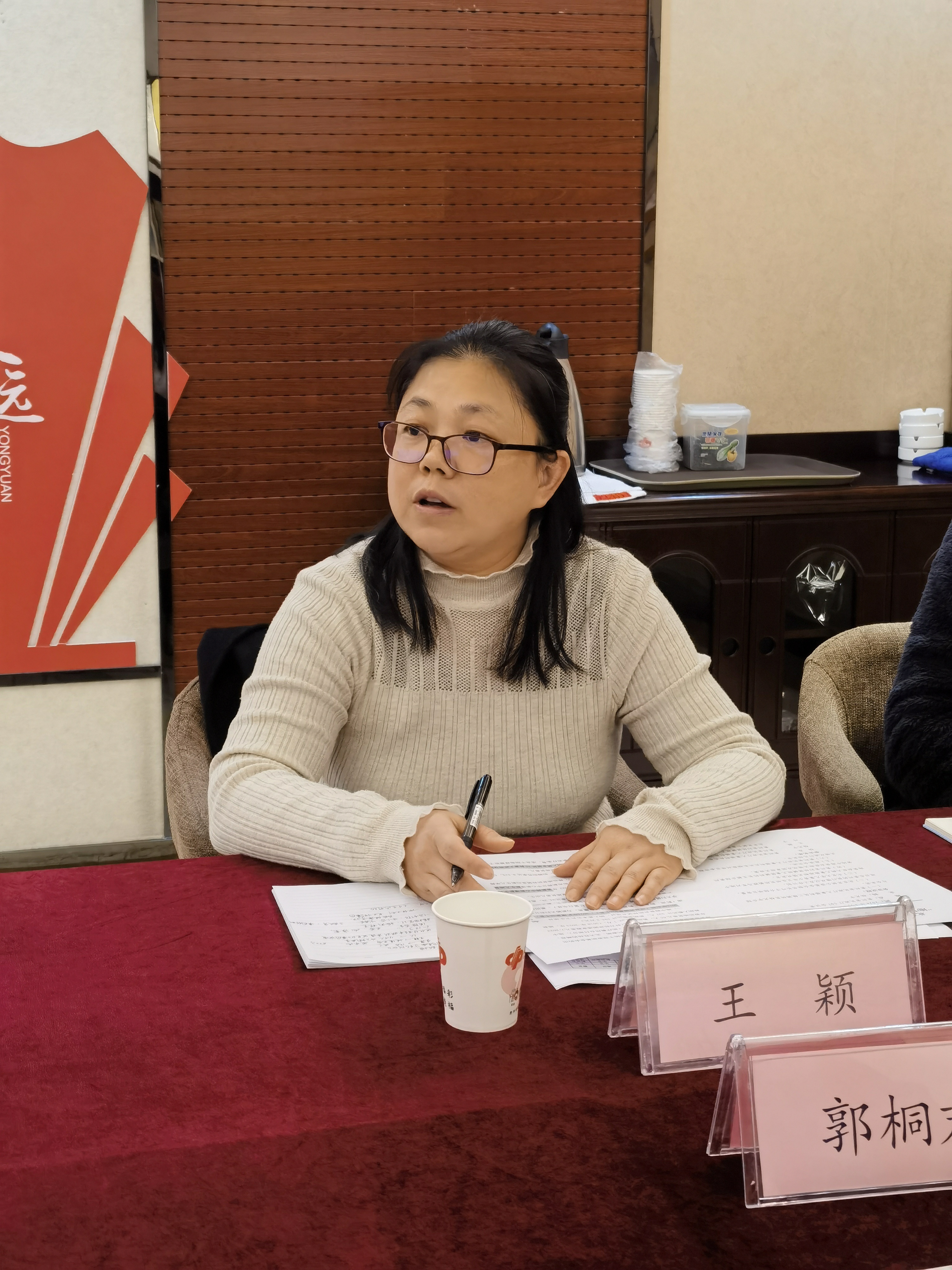JingYan NEWS
Jingyan News | Beijing Jingyan Foundation Conducts Thalassemia Prevention and Control Research in Guizhou
Release time:
Jan 23,2024
Jingyan News | Beijing Jingyan Foundation Conducts Thalassemia Prevention and Control Research in Guizhou
To further promote thalassemia treatment and prevention in China, the Beijing Jingyan Foundation (hereinafter referred to as "Jingyan Foundation") recently conducted research in multiple locations across Guizhou. The Foundation held a series of discussions with relevant government agencies, including the Guizhou Provincial Department of Civil Affairs, as well as local authorities in Luodian County and Sandu County, to thoroughly examine the current state and future directions of thalassemia treatment and prevention efforts in these areas.

Jingyan Foundation Assists 114 Thalassemia Children in Guizhou
Thalassemia is a high-incidence genetic disorder that significantly affects children's health and population quality. It is marked by its challenging treatment and preventable nature. In mild cases, thalassemia leads to anemia, weakening the immune system, while moderate to severe cases require regular blood transfusions and iron chelation therapy to maintain life. This not only imposes a heavy emotional and financial burden on families but also strains social resources.
Guizhou is one of the provinces with the highest prevalence of thalassemia in China. Epidemiological studies indicate that nearly 1 in 10 people in the province are carriers of the thalassemia gene. The situation is particularly pronounced in the minority-populated regions of Qiannan and Qiannan Xinan, which border Yunnan and Guangxi, where the gene carrier rate is relatively high. Given these figures, the importance of thalassemia prevention and control in Guizhou, particularly in reducing the birth of children with severe forms of the disease, is critical.
Since its establishment, the Beijing Jingyan Foundation has focused on children’s health and well-being, with thalassemia being one of its key areas of concern. In 2018, the Foundation launched the Building Love for Thalassemia Action project to support thalassemia prevention and treatment, with Guizhou as a primary focus. Since 2019, the Foundation has been actively assisting children with thalassemia in the province. Over the past five years, it has helped 114 children, providing over 5.13 million RMB in aid.
Exploring Thalassemia Prevention and Treatment: Addressing the Needs of Children with Thalassemia

In 2022, the Guizhou Health Commission issued the Notice on the Launch of the 2022 High-Risk Population Birth Defects Prevention Subsidy Pilot Project. The project, funded by the government, was introduced in regions such as Qiannan and Qiandongnan, offering subsidies for prenatal diagnosis and genetic testing for thalassemia. However, research revealed that the project could only cover a limited portion of the high-risk population in the pilot counties.
At the same time, the situation of thalassemia prevention and control remains challenging due to the shortage of basic healthcare resources and specialized personnel in these areas. Luo Dian County and San Du Shui Autonomous County in Qiannan, key regions for rural revitalization in Guizhou, continue to face underdeveloped social and economic conditions. Families of thalassemia patients in these areas bear significant economic burdens due to the long-term treatment requirements. In response to these challenges, the Beijing Jingyan Foundation invited experts, including Professor Ma Jun, Director of the Institute of Child and Adolescent Health at Peking University, to conduct on-the-ground research and assess the situation in Guizhou.

On January 19, the Jingyan Foundation team visited the Guizhou Department of Civil Affairs, where they held a productive discussion with Yang Yan, Director of the Children’s Welfare Division, Yang Guangyu, a Level-3 Researcher in the Children’s Division, and Wang Ying, Head of the Children’s Health Department at Guizhou Provincial Maternal and Child Health Hospital. The meeting focused on thalassemia assistance and prevention efforts, providing valuable insights and new ideas to enhance local support and prevention strategies for thalassemia.



From January 20 to 21, the team traveled to Luodian County and had discussions with Wu Xiaolan, Vice Mayor of Luodian County, and other local leaders from the Health Bureau, Civil Affairs Bureau, and Family Planning Association. The discussion focused on the development of thalassemia prevention infrastructure, the training of medical professionals, the current level of care for thalassemia patients, and ways to support the families of affected children.

On January 22, the team continued their visit to Sandu Shui Autonomous County, where they met with Wang Xiaomin, Vice Mayor; Mo Na, Director of the Civil Affairs Bureau; Mo Qiurong, Vice President of the Family Planning Association; and leaders from the county’s Maternal and Child Health Hospital. The discussion centered on expanding the coverage of thalassemia prevention services and enhancing the level of assistance provided to affected children.

During their visit to Guizhou, the foundation's staff and volunteers also conducted field visits to local towns and villages, personally meeting with several thalassemia patients and their families. These visits provided them with a deeper understanding of the specific needs of the families and the current state of thalassemia prevention and treatment in the region.
Joint Efforts to Achieve 'Zero Thalassemia' as Soon as Possible
The successful completion of this research has significantly deepened the understanding of thalassemia prevention and control efforts in Guizhou among all stakeholders. It has provided valuable insights into the implementation and future development of the Building Love for Thalassemia Action project in the province, establishing a solid foundation for the continued progress of the initiative.
The long-term goal of the Building Love for Thalassemia Action project has always been to promote prevention and ultimately eradicate thalassemia. The Beijing Jingyan Foundation has consistently pursued a dual approach of "assistance + prevention and control." On one hand, the Foundation has focused on establishing a comprehensive support system for impoverished children with thalassemia, continuously enhancing efforts to provide treatment for affected children in challenging circumstances, improving the diagnostic and treatment capacities of grassroots healthcare institutions, and systematically addressing issues such as the inability to afford or treat severe cases. These efforts aim to reduce the number of children suffering from severe thalassemia. On the other hand, the Foundation has developed a multi-pronged prevention and education initiative, assisting local governments in implementing pre-marital, pre-pregnancy, and prenatal prevention, as well as promoting early diagnosis and treatment for thalassemia. This approach is designed to strengthen prevention and control capabilities in high-incidence areas, ultimately preventing the birth of children affected by thalassemia and working toward the goal of zero thalassemia.

Ms. YE Zi, Secretary-General of the Beijing Jingyan Foundation, expressed during the research visit her hope that the Foundation could play a catalytic role in garnering more attention, policy support, and social focus on thalassemia, "We look forward to collaborating with more partners to help China achieve zero thalassemia at the earliest opportunity."
Keywords:
Related News

